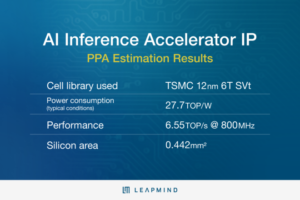Investments and technology innovation are the common underlying themes of this week’s news roundup – with the recent announcement from Intel Capital, some details about the BNN approach pursued by a Japanese startup, and an overview of San Francisco Bay Area venture capital deals in first quarter 2020. Innovations – namely, social distancing wearables – are also being developed to combat the Covid-19 pandemic.
New addition to Intel Capital’s portfolio
Astera Labs, Axonne, and Xsight Labs are the three silicon startups included in the group of eleven companies now joining Intel Capital’s portfolio. Astera Labs (Santa Clara, CA) is described by Intel as “a fabless semiconductor company that develops purpose-built connectivity solutions for data-centric systems to remove performance bottlenecks in compute-intensive workloads such as artificial intelligence and machine learning.” As explained in Astera’s website, the company’s key products are “smart retimers” based on an “innovative low-latency architecture”; these devices are “designed to easily eliminate signal integrity issues for PCI-Express (PCIe) 4.0 and 5.0 interconnects in data-centric applications.” Axonne (Sunnyvale, CA) develops high-speed Ethernet network connectivity solutions for automobiles. The company website provides no further details; according to Intel, however, Axonne solutions make use of “proprietary mixed signal circuits, algorithms and digital signal processing”. Just as secretive is the website of Israel-based Xsight Labs; the Intel press release states that the company “provides new chipset designs” aimed at “accelerating next generation, cloud-based, data-intensive workloads”. The group of eleven companies joining Intel Capital’s portfolio, all described by Intel as “startups”, also includes ProPlus Electronics, a Chinese EDA company that – according to the company’s website – was founded in 2006. Tools cited in the ProPlus website include SPICE modeling, giga-scale SPICE simulations, and a “Design-for-Yield” solution.
Retaining accuracy in binary neural networks: the LeapMind approach
As recently reported by EDACafe, one of the current trends in artificial intelligence is the growing adoption of Binary Neural Networks (BNNs), where weights can only be zero or one. This approach reduces power and storage space relative to INT8 weights, still achieving a good accuracy. New BNN intellectual property is now offered by Tokio-based LeapMind with its “Efficiera” design, an ultra-low power AI inference accelerator IP targeting ASIC and FPGA circuits at the edge. Using 1 bit for weights and 2 bits for activation, the Efficiera IP implemented in a 12 nanometer TSMC process achieves a power efficiency of 27.7 TOP per Watt, a performance of 6.55 TOP per second at 800MHz, and an area of 0.442 square millimeters. LeapMind places special emphasis on new techniques aimed at retaining accuracy in binary neural networks. Some of these techniques – such as quantization-aware training and “pixel embedding” to quantize the first convolution layer – are described in this article, which includes the slides (in English) used by Hiroyuki Tokunaga, CTO of LeapMind, is his keynote speech for the recent CoolChips 23 virtual event.
Beyond silicon: first quarter VC deals in the San Francisco Bay Area
As an update to our February 7th article, let’s take a quick look at Q1 2020 venture capital deals concerning tech companies based in the San Francisco Bay Area. Once again, we extracted the relevant data from the MoneyTree report published by PricewaterhouseCoopers and CB Insights – this time from the Q1 2020 edition; and once again, most of the companies cited below do not belong to the semiconductor industry. In the first quarter of this year, all five largest US investment rounds from venture capital – each above $450 million – involved Bay Area companies: JUUL Labs (electronic cigarettes, San Francisco), Joby Aviation (electric vertical takeoff and landing aircrafts, Santa Cruz), Impossible Foods (“meat from plants”, Redwood City), Lyell Immunopharma (cell-based immunotherapies, South San Francisco), and Snowflake Computing (cloud data platform, San Mateo). Accounting and finance startups saw largest M&A “exits” in first quarter 2020, and four out of five top US deals involve companies based in the Bay Area: Credit Karma (free access to personal credit scores, San Francisco), acquired by Intuit; Plaid Technologies (fintech APIs, San Francisco), acquired by Visa; Vlocity (industry-specific cloud and mobile software, San Francisco), acquired by Salesforce; and Armis (agentless device security, Palo Alto), acquired by Insight Partners. Two Bay Area companies are among the first quarter’s top five IPOs: One Medical Group (membership-based primary care practice, San Francisco) and Revolution Medicines (novel cancer drugs, Redwood City). As for emerging areas (artificial Intelligence, cybersecurity, supply chain tech, robotics, smart cities, InsurTech), top US deals in the first quarter include Pony.ai (autonomous driving technology, Fremont), Netskope (cloud security, Santa Clara), SambaNova Systems (AI system platform, Palo Alto), SentinelOne (enterprise cybersecurity, Mountain View), Sysdig (security for cloud-native DevOps workflows, San Francisco), Arctic Wolf Networks (cybersecurity services, Sunnyvale), Molekule (air purifiers, San Francisco), Cepton Technologies (lidar-based solutions, San Jose). Let’s close with the most active US venture capital firms in first quarter 2020. Four out of seven top VC firms are headquartered in Sand Hill Road (Menlo Park): Khosla Ventures, Andreessen Horowitz, New Enterprise Associates, Kleiner Perkins Caufield & Byers; and a fifth one, General Catalyst, is based in Palo Alto.
Social distancing wearables
Using smartphone-based apps to monitor social distancing obviously requires that all people carry a smartphone. When this is not possible, social distancing can be monitored by ad-hoc wearables that activate an alarm when two people get too close to one another. At least three such devices have already been developed in Europe. Kinexon (Munich, Germany) offers a wearable called SafeZone, based on a UWB (ultra wideband) sensor, that can be worn as a wristband or attached to clothing. Also based on UWB is the device developed by Belgian company Lopos, an Imec spinoff, in collaboration with Ghent university. Called SafeDistance, it enables an accurate (< 15cm error margin) distance measurement. SafeDistance will be available for sale starting 27th of May. The wearable developed by IIT (Istituto Italiano di Tecnologia, Genoa, Italy) is a wristband called iFeel-You that uses a radio signal on the Bluetooth frequencies to monitor the motion of the human body and the distance from another wristband. The device – currently a prototype, not available for sale – also sends an alert when the body temperature is higher than 37.5 degrees.
Using L-band for 5G and IoT services
The US Federal Communications Commission (FCC) has approved with conditions the application from Ligado – a company based in Reston, VA – to deploy a low-power terrestrial nationwide network in the L-Band that would primarily support 5G and Internet of Things services. Authorization has been granted after an extensive technical analysis to ensure that adjacent band operations – including the Global Positioning System (GPS), also using the L band – are protected from harmful interference. L-band is the range of frequencies from 1 to 2 gigahertz.









